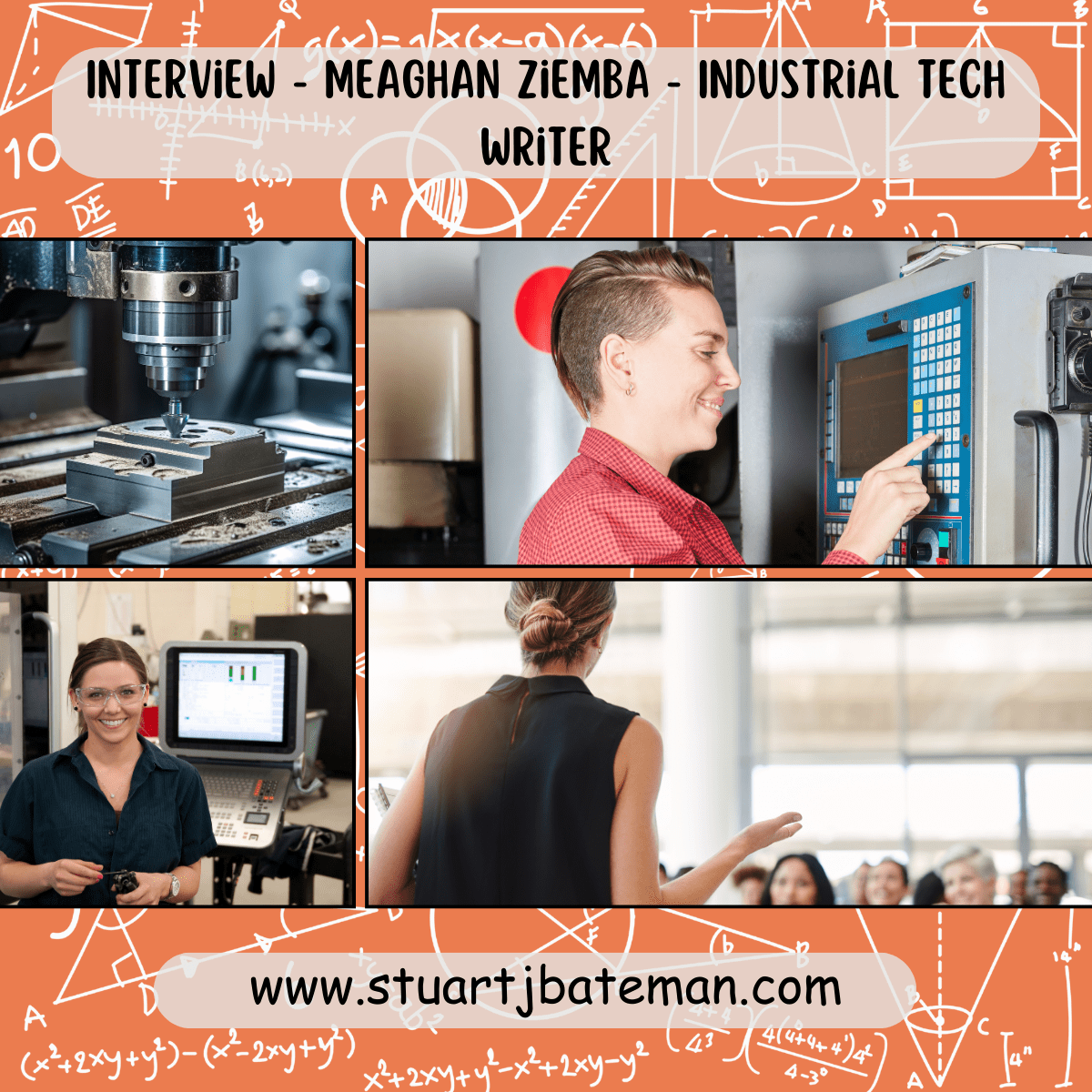Interview – Meaghan Ziemba – Industrial tech writer
The secret of change is to focus all your energy not on fighting the old, but on building the new.
– Socrates

Interview with a twist.
Welcome back for my latest interview! this week I’ve gone in a new direction and spoken to someone who’s spoken with many (hundreds) of engineers, which give her a unique point of view and one I eagerly wanted to take advantage of to see what insights could be gained (and there are some great insights from this interview below).
If you don’t know Meaghan Ziemba, then I urge you to follow her and check out both her podcast “Mavens of Manufacturing” and the LinkedIn channel MTDCNC, she posts regularly from probably every trade show happening in the US, and the interviews are both full of knowledge to share and educational.
On top of all that, she speaks on panels and champions the cause for more women in manufacturing!
Let’s get to that interview!
Insights from Engineers at trade shows
1. Can you briefly describe your career path and what led you to become an industry journalist focusing on engineering?
Like many individuals, I didn’t have a clear direction on what I wanted to do as a professional. I was always interested in cooking, acting, singing, dancing, and modelling. Still, I was told that college was the only option for success and I should pursue something in English because I tested the best in that category.
I started college at the University of Minnesota, I hated it and almost flunked out twice. Then, I got pregnant with my daughter and transferred schools. I learned about Professional and Technical Writing at the University of Wisconsin-Milwaukee and decided that would be my major. I graduated with a B.A. and M.A., and my first job was as an associate editor for a trade magazine called “Product Design and Development.” That opportunity is where my career took off, and I haven’t turned back ever since. In 2020, I started my own LLC, Z-Ink Solutions, as well as Mavens of Manufacturing, a live video broadcast focusing on women in engineering and manufacturing.
2. From your experience at trade shows, what key skills do engineers display in their interactions, presentations, or problem-solving?
Most of the engineers that I’ve spoken with at tradeshows demonstrated strong communication skills, breaking down complex concepts for the diverse audiences that stopped at their booths. You could tell that they were great problem-solvers because they could adapt to customer questions and present tailored solutions to their specific applications.
Many of them also had great adaptability, pivoting discussions based on the needs of those they were speaking with.
Companies that exhibit at trade shows have a chance to sell their products and services directly from the show floor. To accomplish that, their team needs to be great at active listening and respond with empathy and technical precision to gain the trust of potential buyers.
3. What common challenges do engineers frequently discuss at trade shows, and how are they addressing these issues?
Over the last few years, I’ve observed supply chain disruptions, workforce shortages, and integrating new technologies as challenges engineers have been trying to address.
Some solutions involve redesigning products with alternative materials, investing in automation and user-friendly systems to bridge the skills gap, and leveraging modular, scalable technologies.
Other challenges include:
● Rising costs and sustainability: Solutions involved energy-efficient equipment and circular manufacturing processes.
● Quality assurance: Solutions involving real-time monitoring and AI-driven maintenance are gaining traction.
● Cybersecurity: The demand for more customization is being met with stronger security protocols and flexible automation systems.
4. Have you encountered any particularly impressive engineering projects or innovations at trade shows? What made them stand out?
At IMTS I remember stopping by FANUC’s booth, and they had a setup with its Robot G-Code feature, allowing CNC operators to control a FANUC robot through the CNC. So, it’s adding automation to your FANUC CNC. This really stood out because there isn’t a need to know a robotic programming language, and it reduces reliance on a separate tech pendant. There also isn’t a need to hire or retrain a robotics expert staff member, and it’s easier for small to medium-sized shops to add automation.
5. How do engineers and companies at trade shows stay current with the latest developments and technologies in their fields?
From all of the conversations I’ve had with engineers over the years, a lot of them stay current with the latest developments by reading certain publications and attending industry-related conferences and expos. They also sign up for workshops and educational seminars and do as much networking as they can. I know some of them search for relevant posts on LinkedIn and other platforms within their industries and participate in certain forums.
6. In your conversations with engineers, have you noticed the influence of mentors on their career growth? Are there any recurring themes?
Mentors have been essential for many of the engineers I’ve spoken to. Many credit mentors for helping them navigate complex career paths, offering guidance on both technical and soft skills like communication and leadership. A recurring theme is how mentors encouraged them to embrace failure and challenges–whether it was tackling difficult projects, learning new technologies, or stepping into leadership roles.
Another common thread is the value of mentors creating opportunities, like networking connections or pushing them to present at conferences. It’s clear that good mentorship not only builds confidence but also shapes how engineers approach innovation and collaboration.
Mentorship is also important to attract, recruit, and retain more women in engineering.
7. Do engineers often talk about their early career experiences, such as internships or practical training, as key stepping stones?
Yes, all the time. These types of experiences are pivotal to their career growth. Not only do they give them practical skills, but they also help them to understand industry dynamics. By participating in apprenticeships and internships, engineers get real-world exposure, which allows them clarify their career goals, strengthen their confidence, and, in many cases, open doors to full-time roles.
8. When talking with engineers at trade shows, how well do they generally demonstrate soft skills like clear communication, leadership, and teamwork?
Engineers at trade shows often surprise people with their soft skills. They communicate technical concepts clearly and adapt their messaging for different audiences, from customers to C-Suite leaders.
I’ve also seen strong examples of teamwork and how they collaborate across departments to deliver cohesive presentations. Leadership often shines through in how they represent their teams and their ability to address challenges on the spot.
9. Based on your conversations, what advice do engineers commonly share for young engineers or students starting their careers?
They often tell younger generations to never stop learning–whether it’s staying curious about new technologies, taking courses, or learning from failures. They also emphasize the importance of networking, finding mentors, and gaining hands-on experience early. A bit piece of advice is to focus on problem-solving and critical thinking skills since those are the foundation of success in any engineering field.
10. What emerging trends or technologies do you hear engineers discussing most frequently as game-changers for the next five to ten years?
AI and machine learning, particularly in predictive maintenance and process optimization. IIoT is another buzzword, as it’s transforming how we collect and use data.
Additive manufacturing is getting a lot of attention for its potential in prototyping and small-batch production, and sustainability-focused innovations–like energy-efficient machinery and circular manufacturing processes–are seen as must-haves for the future.
Bonus question: Are there any standout resources (courses, books, videos, or websites) that engineers you’ve spoken to often recommend for young professionals?
- Coursera
- The Lean Startup by Eric Ries
- Thinking, Fast and Slow Daniel Kahneman
- SME’s resources
- YouTube channels
Thank you so much Meaghan for taking part in this interview! getting these insights from someone who’s had the privilege to speak to so many engineers is fantastic and I’m grateful for your contribution to my project to share with young engineers and students to help steer them in their careers!
I found the answer to question 6 a great insight, the fact that mentors can also create opportunities for engineers who work with them and encourage them to step out of their comfort zones and really grasp the opportunities out there that’s available to them!
That’s it for this interview, I’ll catch you in the next one!



What are your thoughts? Have I covered everything or is there more you know and would like to share?
I’m always learning and improving this site and my blogs, so please feel free to get in touch with me via LinkedIn or this site to discuss any topics I have covered.
If you’re having trouble finding ways to progress check out these sites filled with free learning tools:


Discover more from The Chartered Engineer
Subscribe to get the latest posts sent to your email.